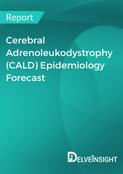Cerebral Adrenoleukodystrophy Epidemiology
DelveInsight's "Cerebral Adrenoleukodystrophy (CALD) - Epidemiology Forecast to 2034" report delivers an in-depth understanding of the disease, historical and forecasted Cerebral Adrenoleukodystrophy (CALD) epidemiology in the 7MM, i.e., the United States, EU5 (Germany, Spain, Italy, France, and the United Kingdom), and Japan.
Geographies Covered
- The United States
- EU5 (Germany, France, Italy, Spain, and the United Kingdom)
- Japan
Study Period: 2021-2034
Cerebral Adrenoleukodystrophy (CALD) Understanding
The DelveInsight Cerebral Adrenoleukodystrophy (CALD) epidemiology report gives a thorough understanding of the Cerebral Adrenoleukodystrophy (CALD) by including details such as disease definition, symptoms, causes, pathophysiology, and diagnosis. It also provides treatment algorithms and treatment guidelines for Cerebral Adrenoleukodystrophy (CALD) in the US, Europe, and Japan. The report covers the detailed information of the Cerebral Adrenoleukodystrophy (CALD) epidemiology scenario in seven major countries (US, EU5, and Japan).
Cerebral Adrenoleukodystrophy (CALD) Epidemiology Perspective by DelveInsight
The Cerebral Adrenoleukodystrophy (CALD) epidemiology division provides insights about historical and current patient pool and forecasted trend for every seven major countries. The Cerebral Adrenoleukodystrophy (CALD) epidemiology data are studied through all possible division to give a better understanding of the Disease scenario in 7MM. The Cerebral Adrenoleukodystrophy (CALD) epidemiology segment covers the epidemiology data in the US, EU5 countries (Germany, Spain, Italy, France, and the UK), and Japan from 2021 to 2034. It also helps recognize the causes of current and forecasted trends by exploring numerous studies, survey reports and views of key opinion leaders.
Cerebral Adrenoleukodystrophy (CALD) Detailed Epidemiology Segmentation
The Cerebral Adrenoleukodystrophy (CALD) epidemiology covered in the report provides historical as well as forecasted Cerebral Adrenoleukodystrophy (CALD) epidemiology scenario in the 7MM covering the United States, EU5 countries (Germany, Spain, Italy, France, and the United Kingdom), and Japan from 2021 to 2034.
The DelveInsight Cerebral Adrenoleukodystrophy (CALD) report also provides the epidemiology trends observed in the 7MM during the study period, along with the assumptions undertaken. The calculated data are presented with relevant tables and graphs to give a clear view of the epidemiology at first sight.
Scope of the Report
- The Cerebral Adrenoleukodystrophy (CALD) report covers a detailed overview explaining its causes, symptoms, classification, pathophysiology, diagnosis and treatment patterns
- The Cerebral Adrenoleukodystrophy (CALD) Epidemiology Report and Model provide an overview of the global trends of Cerebral Adrenoleukodystrophy (CALD) in the seven major markets (7MM: US, France, Germany, Italy, Spain, UK, and Japan)
- The report provides insight into the historical and forecasted patient pool of Cerebral Adrenoleukodystrophy (CALD) in seven major markets covering the United States, EU5 (Germany, Spain, France, Italy, UK), and Japan
- The report helps recognize the growth opportunities in the 7MM for the patient population
- The report assesses the disease risk and burden and highlights the unmet needs of Cerebral Adrenoleukodystrophy (CALD)
- The report provides the segmentation of the Cerebral Adrenoleukodystrophy (CALD) epidemiology
Report Highlights
- 10-year forecast of Cerebral Adrenoleukodystrophy (CALD) epidemiology
- 7MM Coverage
- Prevalent and Diagnosed Cases of Cerebral Adrenoleukodystrophy (CALD)
- Cases of Cerebral Adrenoleukodystrophy (CALD) by Mutation Types
- Cerebral Adrenoleukodystrophy (CALD) Cases associated with Clinical Manifestations
KOL views
We interview, KOLs and SME's opinion through primary research to fill the data gaps and validate our secondary research. The opinion helps understand the total patient population and current treatment pattern. This will support the clients in potential upcoming novel treatment by identifying the overall scenario of the indications.
Key Questions Answered
- What will be the growth opportunities in the 7MM with respect to the patient population pertaining to Cerebral Adrenoleukodystrophy (CALD)?
- What are the key findings pertaining to the Cerebral Adrenoleukodystrophy (CALD) epidemiology across 7MM and which country will have the highest number of patients during the forecast period (2025-2034)?
- What would be the total number of patients of Cerebral Adrenoleukodystrophy (CALD) across the 7MM during the forecast period (2025-2034)?
- Among the EU5 countries, which country will have the highest number of patients during the forecast period (2025-2034)?
- At what CAGR the patient population is expected to grow in 7MM during the forecast period (2025-2034)?
- What is the disease risk, burden and unmet needs of Cerebral Adrenoleukodystrophy (CALD)?
- What are the currently available treatments of Cerebral Adrenoleukodystrophy (CALD)?
Reasons to buy
The Cerebral Adrenoleukodystrophy (CALD) Epidemiology report will allow the user to -
- Develop business strategies by understanding the trends shaping and driving the global Cerebral Adrenoleukodystrophy (CALD) market
- Quantify patient populations in the global Cerebral Adrenoleukodystrophy (CALD) market to improve product design, pricing, and launch plans
- Organize sales and marketing efforts by identifying the age groups and sex that present the best opportunities for Cerebral Adrenoleukodystrophy (CALD) therapeutics in each of the markets covered
- Understand the magnitude of Cerebral Adrenoleukodystrophy (CALD) population by its epidemiology
- The Cerebral Adrenoleukodystrophy (CALD) Epidemiology Model developed by DelveInsight is easy to navigate, interactive with dashboards, and epidemiology based with transparent and consistent methodologies. Moreover, the model supports data presented in the report and showcases disease trends over 10-year forecast period using reputable sources
Key Assessments
- Patient Segmentation
- Disease Risk & Burden
- Risk of disease by the segmentation
- Factors driving growth in a specific patient population

-pipeline.png&w=256&q=75)
-market.png&w=256&q=75)
